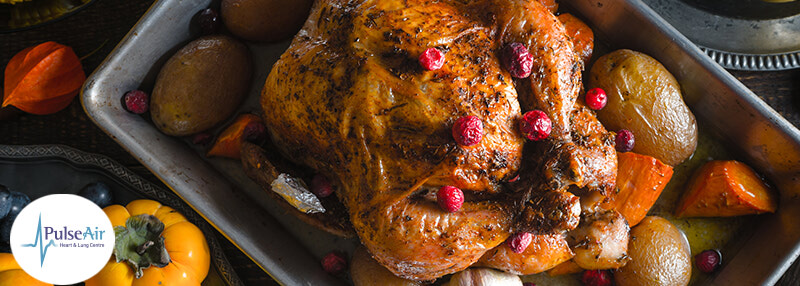Thanksgiving in Canada is a time to gather with loved ones, share gratitude, and enjoy comforting food and drink. But for those living with heart conditions, especially atrial fibrillation (AFib), the holiday season can also bring hidden risks.
One of the most common seasonal concerns is Holiday Heart Syndrome, a temporary heart rhythm disturbance often triggered by overindulgence in alcohol and rich meals. Understanding how these habits affect your heart can help you enjoy the holidays safely and mindfully.
What Is Holiday Heart Syndrome?
Holiday Heart Syndrome refers to episodes of irregular heartbeat (arrhythmia), most commonly AFib, that occur in otherwise healthy individuals after consuming large amounts of alcohol or food. These episodes may feel like:
- A racing, fluttering, or pounding heart
- Dizziness or light-headedness
- Chest discomfort
- Shortness of breath
While often temporary, these episodes can be serious—especially for those with existing heart conditions. Alcohol interferes with heart cell signalling and calcium regulation, making the heart more prone to irregular electrical activity. Large meals can overstimulate the vagus nerve, which also affects heart rhythm.
Why Thanksgiving Can Be Risky for Your Heart
Canadian Thanksgiving traditions often involve:
- Heavy meals rich in fat, salt, and sugar
- Alcohol consumption, sometimes more than usual
- Late nights and disrupted sleep
- Stress from hosting, travel, or family dynamics
These factors can combine to increase your risk of AFib episodes or other heart rhythm disturbances. Even people who don’t normally drink or overeat may be vulnerable if they indulge more than usual during the holidays.
Tips for a Heart-Healthy Thanksgiving
Whether you’re managing AFib or simply want to protect your heart, here are some practical tips to enjoy the holiday safely:
1. Eat Smaller Portions
Large meals can trigger arrhythmias by putting pressure on your digestive system and stimulating the vagus nerve. Try:
- Using a smaller plate
- Eating slowly and mindfully
- Listening to your body’s hunger and fullness cues
2. Limit Alcohol Intake
Avoid binge drinking and stick to Canada’s Low-Risk Alcohol Drinking Guidelines:
- No more than 2 drinks per day for men
- No more than 1 drink per day for women
- Aim for no more than 10 drinks per week for women and 15 for men
Alcohol can shorten the heart’s refractory period and cause electrolyte imbalances, increasing AFib risk.
3. Stay Hydrated
Dehydration can worsen heart symptoms. Drink water throughout the day, especially if you're consuming alcohol or salty foods. A glass of water before meals can also help prevent overeating.
4. Get Enough Sleep
Late-night celebrations and poor sleep can increase your risk of AFib the next day. Aim for 7–9 hours of quality sleep, even during the holidays. Consider winding down with a calming bedtime routine.
5. Manage Stress
Holiday stress is real. Reduce tension by:
- Taking short walks
- Practising deep breathing or mindfulness
- Setting realistic expectations for gatherings
- Asking for help with hosting or meal prep
Chronic stress is linked to increased risk of heart attack and stroke.
6. Stick to Your Care Plan
Don’t skip medications or appointments just because it’s a holiday. Keep your routine consistent and talk to your healthcare provider if you notice any changes in symptoms.
Tip: If you experience symptoms like chest pain, fainting, or a sustained irregular heartbeat, seek medical attention immediately.
Celebrate Safely with PulseAir
At PulseAir Heart & Lung Centre, we want you to enjoy Thanksgiving with peace of mind. If you or a loved one are living with AFib or another heart condition, our team is here to help you navigate the season with confidence.
We offer:
- Cardiology consultations
- AFib and arrhythmia management
- Holter monitoring and ECGs
- Lifestyle guidance for heart health
Book a consultation or explore our resources to learn more about managing heart health during the holidays.


